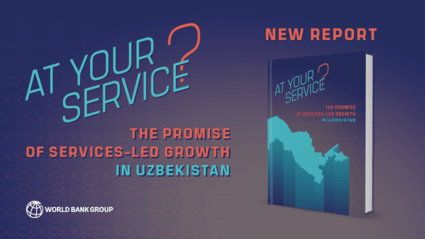The World Bank has released a new report providing an in-depth analysis of Uzbekistan's services sector, a key driver of economic growth. The report highlights the sector's challenges and opportunities, and recommends reforms required for its liberalization and modernization, leading to increased labor productivity, jobs, and investment, thereby contributing to sustained growth.
The services sector is a key pillar of Uzbekistan’s economy, playing a central role in driving growth and job creation. In 2023 nominal terms, it contributed 43.9% to the country’s GDP, outpacing industry (23.5%), agriculture (20.6%), and construction (7.1%).
The services sector, now responsible for more than half of all jobs in the country, has played a key role in its structural transformation since independence. From 1991 to 2022, employment in services grew from 37% to 50%, effectively offsetting nearly the entire decline in the share of agricultural employment.
Since 2017, market reforms in Uzbekistan have driven steady economic growth, with an average annual GDP growth rate of around 5.5%. In 2023, GDP grew by 6.3%, led by a rapidly expanding services sector. The economy is projected to grow by another 6% in 2024, ranking among the top five fastest growing in the Europe and Central Asia region.
However, structural transformation has slowed, with the services sector's contribution to GDP increasing only slightly from 41% in 2010 to 44% in 2022, and its employment share stabilizing around 50% since 2010. To ensure sustainable growth, Uzbekistan must prioritize reforms that foster private sector expansion and further develop the services sector, particularly in global innovator services such as ICT, professional (e.g., consulting, legal, architecture, engineering), and financial services.
In Uzbekistan, challenges remain in fully harnessing the services sector's potential for growth and jobs. Specifically, around 60% of employment in the sector is concentrated in low-skilled services such as retail, hospitality, and transportation, which have shown limited labor productivity gains between 2017 and 2022. Social services like health and education have expanded primarily due to increased government spending, contributing to 77% of all new services jobs between 2017 and 2022.
Compared to these subsectors, knowledge-intensive global innovator services are more than twice as productive as manufacturing, yet they account for only 4% of all services jobs. Private sector-led growth can increase the share of global innovator services and boost labor productivity in low-skilled services, which, in turn, can benefit goods-producing sectors where these services are important inputs.
To enhance the performance of various service subsectors, the World Bank report suggests that Uzbekistan focuses on addressing key challenges through progress along three areas of policy action: connectivity, contestability, and capabilities (3Cs). Why are these factors so important?
As a double landlocked country, Uzbekistan must enhance both physical and digital connectivity to improve market access. The country ranks 88th of 139 economies globally in the World Bank’s 2023 Logistics Performance Index for physical connectivity.
In terms of digital connectivity, access to high-speed mobile internet like 4G/LTE remains limited, which at 92 percent coverage in 2023 is less than universal coverage. While around 40% of individuals use digital payments. These constraints particularly hinder the development of ICT services and digital businesses.
In terms of contestability, the World Bank-WTO Services Trade Restrictiveness Index (STRI) shows that Uzbekistan remains completely closed to cross-border delivery of services in 11 out of 31 subsectors, including several professional services like architecture, engineering, and accounting.
Meanwhile, ‘personal data localization’ laws significantly restrict ICT services delivery across borders. Additionally, state-owned enterprises dominate services subsectors like telecommunications and air and rail transportation, creating significant barriers to market competition and private investment.
In terms of capabilities, Uzbekistan needs to invest further in developing core skills and expertise required in various service subsectors. Specifically, access to tertiary education remains limited, with enrolment rates at 31.5% in 2022—less than half the Europe and Central Asia average of 80%. Additionally, basic ICT skills are underdeveloped, with only around 15% of the population demonstrating such competencies.
The World Bank report recommends implementing regulatory reforms to address the above-mentioned barriers hindering private sector growth and services sector development. Key policy actions include:
- Scale up investments in physical infrastructure (roads, railways, airports) and digital infrastructure (broadband internet, 4G/LTE).
- Enhance logistics efficiency by improving customs procedures and tracking systems.
- Liberalize markets by reducing state monopolies in telecommunications, air and rail transportation.
- Remove restrictions on cross-border services trade in ICT through relaxing personal data localization requirements, while striking a balance with privacy considerations.
- Invest in tertiary education to raise the pool of skilled workers.
- Support vocational training programs such as "One Million Uzbek Coders" to develop ICT skills.
- Ease visa restrictions to attract global talent to emerging hubs like Tashkent’s IT Park.
The implementation of these reforms that result in the liberalization and modernization of various service subsector will deliver large economic gains to Uzbekistan:
- Regulatory reforms in services trade could boost Uzbekistan’s real GDP by up to 17% with full liberalization.
- Finance, communication, and insurance subsectors can expand by 23%, 39%, and 45% respectively.
- Liberalization of the services sector also yields benefits to other sectors, with industrial subsectors like pharmaceuticals, electronics, and machinery projected to grow by 24%, 30%, and 23%, respectively.
- Greater contestability in the services sector could boost real income by up to 16% with full liberalization, increasing wages for both skilled and unskilled workers.
Uzbekistan’s WTO accession offers an opportunity to implement reforms that liberalize the services sector. These reforms will align the sector with global standards, attracting foreign investment, fostering innovation, and boosting competitiveness.












